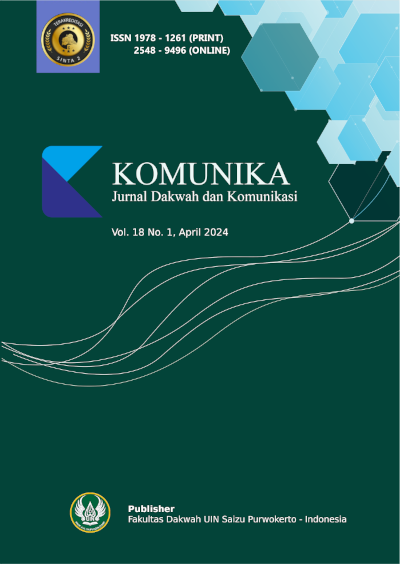The Social Construction of Tolerance Discourse through Online Media: Study of NU Online
DOI:
https://doi.org/10.24090/komunika.v18i1.8431Keywords:
Tolerance, Social Construction of Reality, NU OnlineAbstract
As the largest Islamic organization in Indonesia, Nahdlatul Ulama (NU) plays a major role in maintaining the country's diversity. As we know, intolerance among Indonesians has become a major problem for the nation. This research examines how NU constructs and spreads the value of tolerance through its online media, called “NU Online.” The theory of the social construction of reality, written by Berger and Luckmann, is used as a theoretical framework to depict internalization, objectification, and externalization processes in NU Online while constructing and spreading tolerance issues. Data were collected using a qualitative method, interviewing NU Online's members and editorial teams. The results of this study show that NU has an organizational value that regards tolerance as an important aspect of religious life. Moreover, the Islamic value of NU became a behavioral basis for all NU members, including members of NU Online. This value is called Ahlusunnah Waljamaah. Since becoming NU members, they have been internalized by the Ahlusunnah Waljamaah as a core value of the organization. Furthermore, in NU Online, this value spreads to the public through objectification and externalization processes.Downloads
References
Adzkia, A. and Indra, S. (2015). Kriteria Situs Islam Radikal Versi BNPT. Available at: https://www.cnnindonesia.com/teknologi/20150401093434-185-43429/kriteria-situs-islam-radikal-versi-bnpt/. Diakses tanggal 12 Desember 2022.
Bakri, Syamsul. (2004). Islam dan Radikalisme Agama Kontemporer, Jurnal Dinika Volume 3, 1, 1-12.
Berger, Peter L. dan Luckmann, Thomas. (2012). Tafsir Sosial Atas Kenyataan. Jakarta: LP3S
Bramantio., Firdaus, Rima., Afdholy, Nadya. (2023). How the Media Constructs Namibian Tourism as Escapism for Global Travelers in the Post-Pandemic Era. Journal of Namibian Studies, 33, 2618–2642. DOI: https://doi.org/10.59670/jns.v33i.647
Damayanti., Thayibi., Gardhiani., Limy., (2003). Radikalisme Agama Sebagai Salah Satu Bentuk Perilaku menyimpang. Jurnal Kriminologi Indonesia, 3, 43-57.
Fahri, M., & Zainuri, A. (2019). Moderasi beragama di Indonesia. Intizar, 25(2), 95-100.
Hennink, Monique., Hutter, Inge., Bailey, Ajay. (2011). Qualitative Research Methods. Sage Publications.
Hermawati, R., Paskarina, C., & Runiawati, N. (2017). Toleransi antar umat beragama di Kota Bandung. Umbara, 1(2). DOI: https://doi.org/10.24198/umbara.v1i2.10341
Hidayat, Dedy N. (2008). Dikotomi Kualitatif-Kuantitatif dan Varian Paradigmatik dalam Penelitian Kualitatif. Jurnal Ilmiah Scriptura, 2, 81-94. DOI: https://doi.org/10.9744/scriptura.2.2.81-94
Hjerm, M., Eger, M.A., Bohman, A. et al. A New Approach to the Study of Tolerance: Conceptualizing and Measuring Acceptance, Respect, and Appreciation of Difference. Soc Indic Res 147, 897–919 (2020). https://doi.org/10.1007/s11205-019-02176-y DOI: https://doi.org/10.1007/s11205-019-02176-y
Jatuporn, O. (2023). The Critical Analysis of the Construction of Teacher-ness Identities in Contemporary Thai Films. Asia Social Issues, 16(5), e258892. https://doi.org/10.48048/asi.2023.258892 DOI: https://doi.org/10.48048/asi.2023.258892
Lepeng, Bruce Yu. (2023). Exploring The Influence of Science-Fiction: How Are Sci-Fi Novels An Agent In The Construction Of Reality?. The International Journal Of Humanities & Social Studies, 11(03), 30-37.
Lincoln, Yvonna S., Lynham, Susan A., and Guba, Egon G. (2011). Paradigmatic Controversies, Contradictions, and Emerging Confluences, Revisited. Sage Handbook of Qualitative Research. USA: Sage Publications.
Mangantibe, V. Y., & Taliwuna, M. C. (2021). Toleransi Beragama Sebagai Pendekatan Misi Kristen Di Indonesia. Jurnal Ilmiah Religiosity Entity Humanity (JIREH), 3(1), 33-47. DOI: https://doi.org/10.37364/jireh.v3i1.56
Prasetiawati, E. (2017). Urgensi Pendidikan Multikultur untuk Menumbuhkan Nilai Toleransi Agama di Indonesia. Tapis: Jurnal Penelitian Ilmiah, 1(02), 272-303. DOI: https://doi.org/10.32332/tapis.v1i02.876
Rokhmad, Abus. (2012). Radikalisme Islam dan Upaya Deradikalisasi Paham Radikal, Jurnal Walisongo, 20, 79-113. DOI: https://doi.org/10.21580/ws.20.1.185
Schock, Michael Welles. (2023). Re-defining the Character Arc through Berger and Luckmann’s The Social Construction of Reality. Journal of Screenwriting, 14(1), 75 – 93. DOI: https://doi.org/10.1386/josc_00116_1
Setyawan, N. B., & Arifin, R. (2019). Analisis Perlindungan Terhadap Toleransi Kebebasan Beragama di Indonesia dalam Perspektif Hak Asasi Manusia. Nurani: Jurnal Kajian Syari'ah dan Masyarakat, 19(1), 27-34. DOI: https://doi.org/10.19109/nurani.v19i1.3100
Taufik, Cevi Mochamad., & Sila, Gita Eka. (2023). Construction of Reality and Segregative Content of Islamic Media. Communicatus: Jurnal Ilmu Komunikasi. 7(1), 85-104 DOI: https://doi.org/10.15575/cjik.v7i1.19950
Umar, Ahmad Rizky Mardhatillah. (2010). Melacak Akar Radikalisme Islam di Indonesia. Jurnal Ilmu Sosial dan Ilmu Politik Universitas Gajah Mada. 14, 169-186.
Zen, Fathurin. (2004). NU Politik: Analisis Wacana Media. Yogyakarta: LKiS
Downloads
Published
Issue
Section
License
Copyright (c) 2024 Suluh Gembyeng Ciptadi

This work is licensed under a Creative Commons Attribution-ShareAlike 4.0 International License.
Authors who publish with this journal agree to the following terms:
- Authors retain copyright and grant the journal right of first publication with the work simultaneously licensed under a Creative Commons Attribution-ShareAlike 4.0 International License that allows others to share the work with an acknowledgement of the work's authorship and initial publication in this journal.
- Authors are able to enter into separate, additional contractual arrangements for the non-exclusive distribution of the journal's published version of the work (e.g., post it to an institutional repository or publish it in a book), with an acknowledgement of its initial publication in this journal.
- Authors are permitted and encouraged to post their work online (e.g., in institutional repositories or on their website) prior to and during the submission process, as it can lead to productive exchanges, as well as earlier and greater citation of published work (See The Effect of Open Access).



























